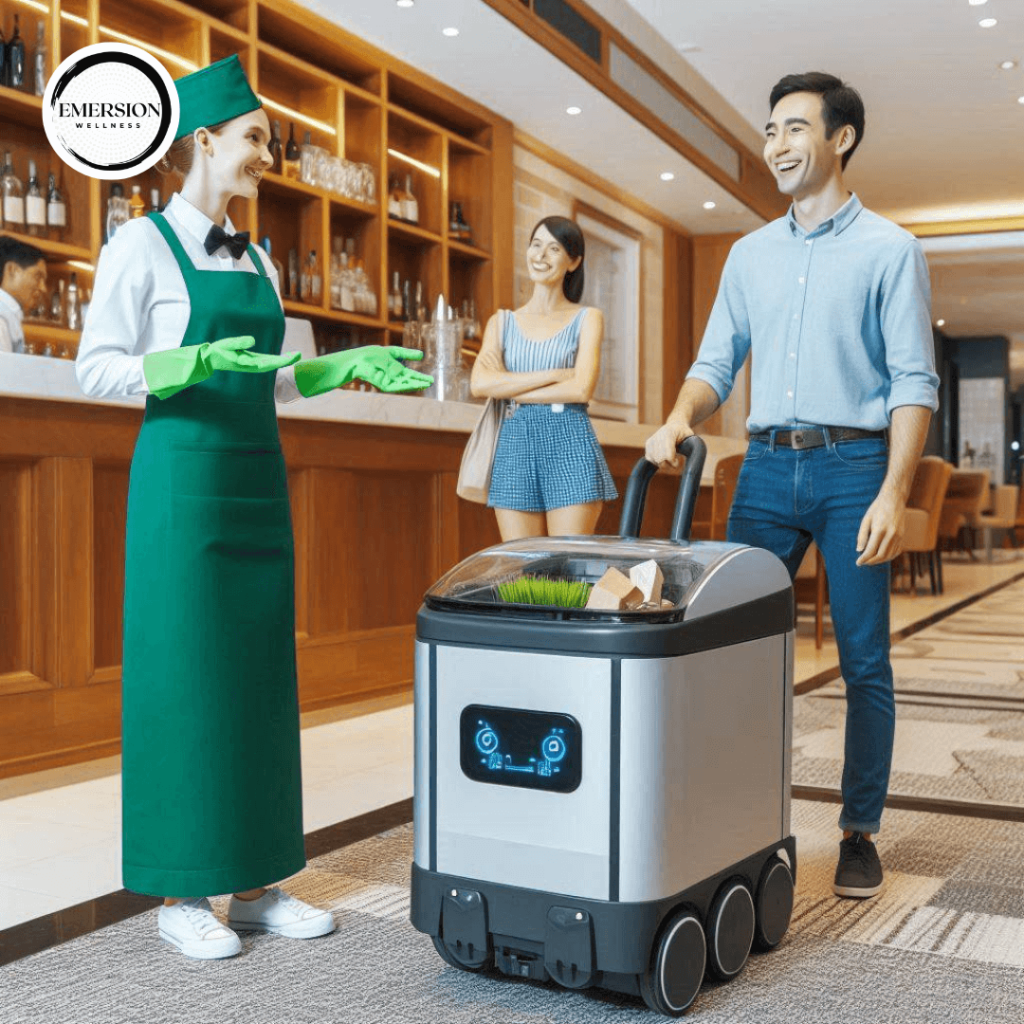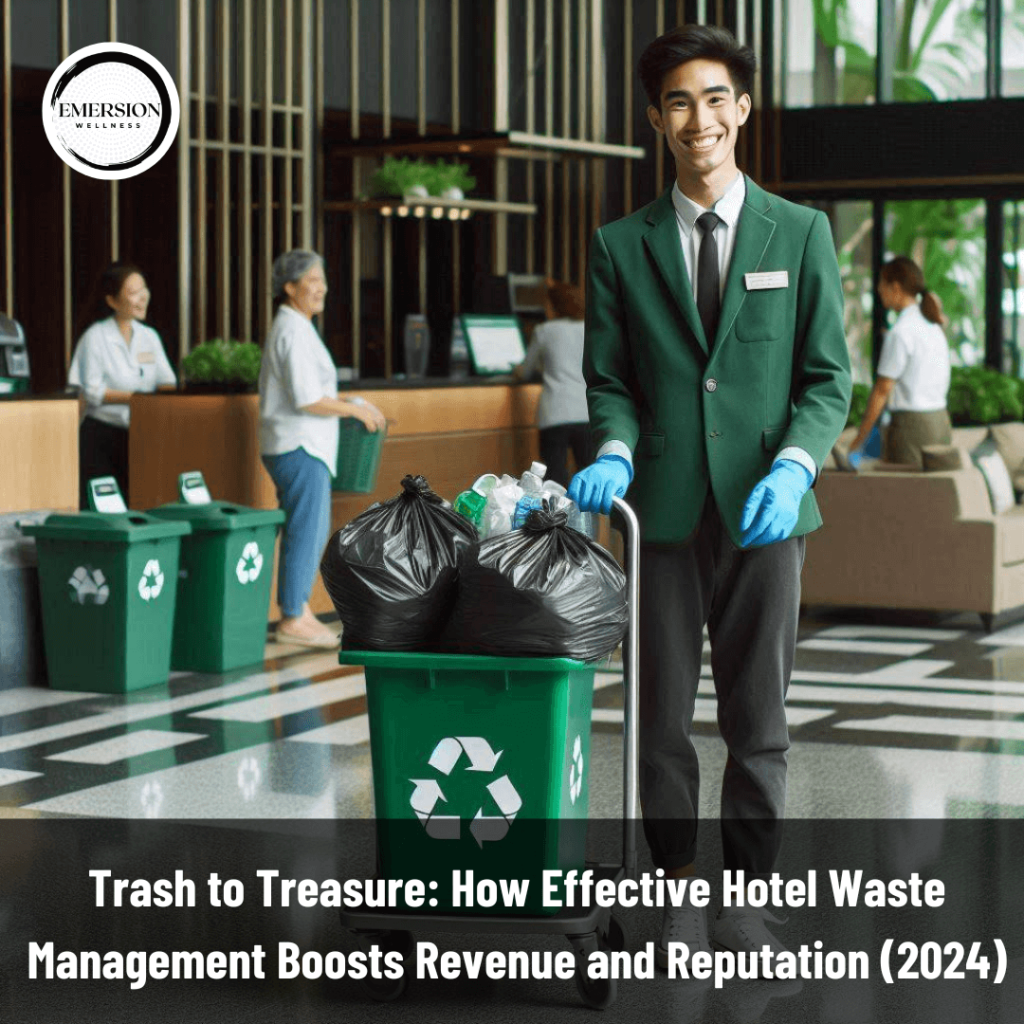In today's environmentally conscious world, travelers are increasingly seeking hotels that prioritize sustainability. Effective hotel waste management is no longer just an environmental responsibility; it's a smart business decision with the potential to boost your hotel's revenue and reputation.
During my time working in the hotel industry, I've witnessed firsthand the transformative power of implementing a well-structured waste management program. By focusing on waste reduction, reuse, and recycling initiatives, we were able to significantly decrease our waste disposal costs. But the benefits went beyond just the bottom line. We also noticed a positive shift in guest perception. Our commitment to sustainability resonated with eco-conscious travelers, leading to increased bookings and positive online reviews.
Critical Takeaways:
- Implement a comprehensive hotel waste management plan to reduce waste generation, minimize landfill contributions, and potentially cut waste disposal costs.
- Prioritize waste reduction, reuse, and recycling to minimize environmental impact and create a more sustainable operation.
- Leverage guest education and staff training to foster a culture of environmental responsibility within your hotel.
A Startling Statistic: According to the International Solid Waste Association (ISWA), the hospitality industry generates a significant amount of solid waste, with an estimated 1.3 billion tons produced globally each year [1]. This staggering figure underscores the importance of implementing effective waste management strategies in hotels.
This comprehensive guide delves into the world of hotel waste management. We'll explore practical strategies for reducing waste, discuss the benefits of recycling and composting, and provide actionable tips you can implement to create a more sustainable and profitable hotel operation.
Hotel Waste Management: Minimizing What Goes in the Bin
Smart Purchasing and Inventory Management
Carefully plan your inventory needs and purchase supplies in bulk whenever possible to minimize packaging waste. Opt for concentrated cleaning products and multi-use items to reduce single-use disposables.
Example: Instead of purchasing individual bottles of shampoo and conditioner for guest rooms, consider switching to refillable dispensers filled with concentrated products. This can significantly reduce plastic waste and potentially lower your overall purchasing costs.
Embracing Reusable Amenities
Replace disposable toiletries with high-quality, refillable dispensers for shampoo, conditioner, body wash, and lotion. Offer reusable water bottles or provide guests with the option to purchase a branded bottle during their stay.
Example: A luxury hotel chain might partner with a sustainable amenities company to offer guests refillable glass dispensers containing organic bath products. This not only reduces waste but also elevates the guest experience by providing a touch of luxury.
Food Waste Reduction Strategies
Implement portion control measures in your restaurants to minimize food waste. Explore creative ways to utilize leftover food, such as donating to local charities or composting food scraps.
Example: A hotel buffet restaurant could offer smaller portion options alongside standard portions to cater to guests with varying appetites. Additionally, they could partner with a local food bank to donate any leftover food at the end of the day, ensuring it doesn't go to waste.
Paper Reduction in the Workplace
Promote paperless communication within your hotel by utilizing electronic documents, online reservations, and digital guest registration processes.
Example: Encourage guests to opt for e-receipts instead of paper receipts. Additionally, consider implementing a digital guest communication platform to send important information and updates electronically.

Hotel Waste Management: Transforming Waste into Resources
Setting Up a Streamlined Recycling System
Designate clear and well-labeled recycling bins throughout your hotel for easy guest participation. Partner with a reputable waste management company that offers recycling services specific to your hotel's needs.
Example: Implement a color-coded recycling system with clearly labeled bins for paper, plastic, glass, and metal waste. Train your housekeeping staff to properly sort waste items and ensure guests understand the recycling guidelines.
Educating Guests on Recycling
Provide clear signage and informative materials in guest rooms and common areas to educate guests about your hotel's recycling program. Consider including a short explanation of the importance of recycling in your guest welcome packet.
Example: Create visually appealing infographics or short video clips explaining what items can be recycled in your hotel. Display these materials in guest rooms, elevators, and common areas to raise awareness and encourage participation.
The Benefits of Partnering with Eco-Friendly Suppliers
Seek out suppliers who offer eco-friendly products and packaging. This could include companies that utilize recycled materials in their packaging or offer biodegradable alternatives to traditional disposable items.
Example: Partner with a linen company that provides towels and sheets made from recycled materials. This demonstrates your commitment to sustainability throughout your entire supply chain.
Composting Food Scraps and Yard Waste
Explore the possibility of composting food scraps and yard waste on-site or partnering with a local composting facility. Compost can be used to nourish gardens and landscaping, reducing your reliance on chemical fertilizers.
Example: A hotel with extensive on-site landscaping might consider investing in a small-scale composting system to convert food scraps and yard waste into nutrient-rich compost for their gardens. This not only reduces waste but also creates a closed-loop system that benefits the hotel's grounds.
Conclusion: Hotel Waste Management
By implementing a comprehensive hotel waste management plan, you're not just doing your part for the environment; you're also making a smart business decision. Effective waste management strategies can:
- Reduce operational costs: Lower waste disposal fees and potentially save money on purchasing supplies by implementing waste reduction initiatives.
- Enhance guest experience: Eco-conscious travelers appreciate hotels that prioritize sustainability. A well-managed waste management program demonstrates your commitment to environmental responsibility, which can resonate with guests and lead to positive reviews and increased bookings.
- Boost your reputation: Positioning your hotel as a leader in sustainability can enhance your brand image and attract environmentally conscious travelers.
Remember, even small changes can make a significant impact. Start by implementing a few key strategies from this guide and gradually build a more comprehensive waste management program for your hotel.
Here at Emersion Wellness, we understand the importance of creating a sustainable and profitable hotel operation. While waste management is a crucial aspect, it's just one piece of the puzzle. We offer a variety of consulting services designed to help hotels maximize revenue and profitability.
Ready to unlock the hidden revenue potential within your hotel?
Contact Emersion Wellness today to discuss how our comprehensive hospitality consulting services, including our signature weight loss program, can help you achieve your hotel's revenue and sustainability goals.
FAQs
1. What are the different types of waste generated in hotels?
Hotels produce a variety of waste streams, including: Leftover food from kitchens and restaurants, spoiled food items. Office supplies, used guestroom amenities, marketing material. Bottles, packaging materials, disposable utensils. Bottles and drinking glasses. Leaves, grass clippings, pruning’s from landscaping.
2. How can I get my hotel staff on board with a new waste management program?
Staff training is crucial for the success of any waste management program. Educate your employees about the importance of waste reduction and recycling, and provide clear instructions on how to sort waste items properly. Incentivize participation by recognizing staff members who consistently demonstrate commitment to the program.
3. What are some creative ways to encourage guest participation in recycling?
Utilize visually appealing signage and infographics to explain your recycling program. Offer small rewards or incentives for guests who actively participate in recycling. Partner with local businesses to offer discounts or promotions to guests who bring their own reusable water bottles or shopping bags.
4. What are the legal requirements for hotel waste management?
Waste management regulations can vary depending on your location. It's crucial to research and comply with all local, state, and federal laws regarding waste disposal and recycling in your area.
5. How much can a hotel realistically save by implementing a waste management program?
The cost savings associated with waste management programs can vary depending on the size of your hotel, the types of waste generated, and the specific strategies implemented. However, studies have shown that hotels can potentially reduce waste disposal fees by 20-50% through effective waste reduction and recycling initiatives.
6. What are some resources available to help me learn more about hotel waste management?
Numerous resources are available to assist you in implementing a successful hotel waste management program. Industry associations like the American Hotel & Lodging Association (AHLA) offer educational materials and best practices for sustainable hotel operations. Additionally, many waste management companies provide resources and guidance specifically tailored to the hospitality industry.
7. Do I need to invest in expensive equipment to implement a waste management program?
Not necessarily. While some hotels may choose to invest in composting systems or specialized recycling equipment, a successful program can be launched with minimal upfront costs. Start by focusing on simple waste reduction strategies like portion control in your restaurants and replacing disposable toiletries with refillable dispensers.
8. How can I measure the success of my hotel's waste management program?
Tracking key metrics is essential for measuring the success of your hotel's waste management program. Here are some important metrics to consider: Monitor the weight or volume of waste disposed of each month. Look for trends indicating a decrease in waste generation over time. Calculate the percentage of waste diverted from landfill through recycling programs. Aim to continuously increase your recycling rate. Track your monthly waste disposal fees. A successful program should lead to a decrease in these costs. Pay attention to guest feedback regarding your waste management program. Positive comments indicate guest satisfaction with your sustainability efforts.
9. Is composting a viable option for all hotels?
Composting can be a valuable waste management strategy for hotels with access to outdoor space and sufficient food scraps to justify the investment. However, it's not suitable for all hotels. Factors to consider include: Composting systems require dedicated space for composting bins and potentially finished compost. Hotels with limited food waste generation may not produce enough scraps to make composting feasible. Research local regulations regarding composting to ensure compliance.
10. Should I outsource my hotel's waste management program?
Outsourcing your waste management program can be a viable option for some hotels, particularly smaller properties that may not have the resources or expertise to manage the program in-house.
Also, see Don't Get Hacked! 5 Shocking Stats That Prove Why Cyber Security in Hotels is Crucial

I'm Nathan Baws, a nutrition nerd, exercise and weight loss expert, and an unwavering advocate for good health. As the founder of Emersion Wellness, I'm passionate about crafting Seamless Weight Loss Programs to supercharge hotel revenue and transform lives. We've pioneered the World's First Plug & Play Weight Loss Programs for top hotels and resorts, sparking a wellness revolution. Beyond my professional journey, you'll often find me hiking, swimming, and riding the waves, embracing every moment in nature. Join me on this exhilarating journey towards diet, health and wellness.

